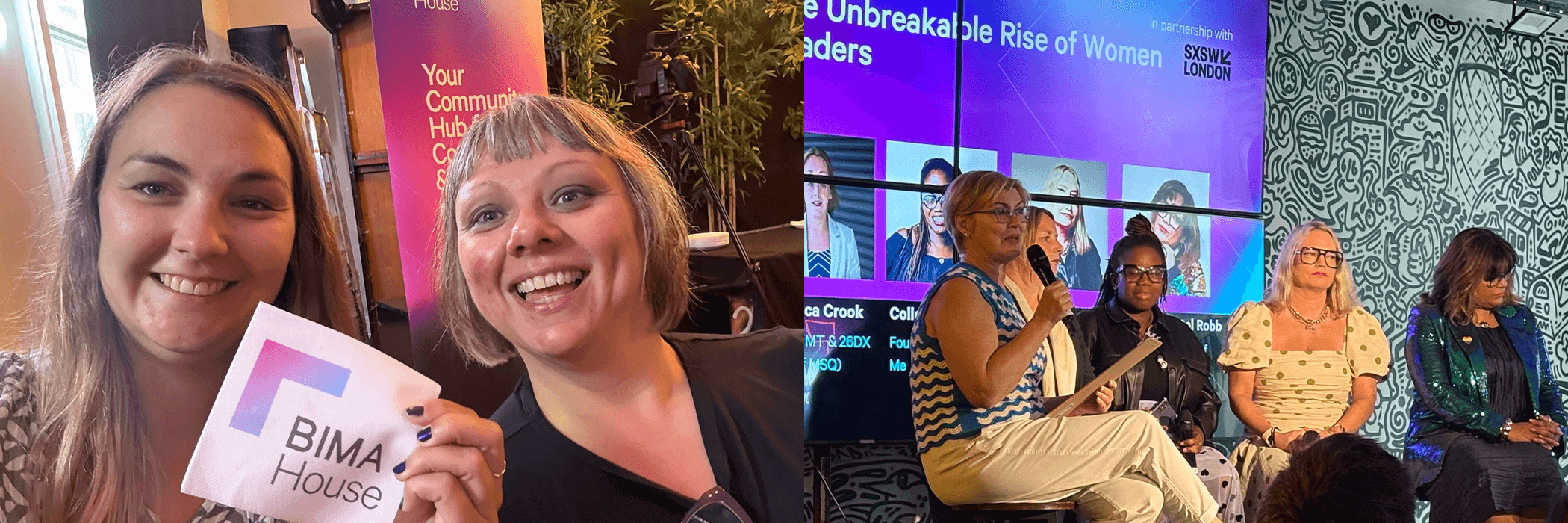
From AI-powered creativity to the rise of agentic experiences, here’s what we took away from our day at BIMA House during SXSW London.

Representing Filter at SXSW London, our brilliant team members Allie Tupper (Project Manager) and Char Bryce (Digital Account Manager) attended the BIMA House event.
Throughout the day, they explored a series of insightful talks centred on how AI is transforming creativity, reshaping marketing strategies, and raising important ethical questions across the industry.
The day kicked off with a session from Jellyfish, who shared their blueprint for how creative teams can collaborate with AI. They showcased a full brand concept created entirely using AI tools, from the brand name and colour palette to visual identity and even a video ad starring a synthetic influencer, all completed within 24 hours.
It was both inspiring and slightly unsettling to see how fast and seamlessly this process came together. As creatives, we’re used to seeing AI as a tool for speed or ideation, but this was a full production pipeline. The message was clear: AI creative sits somewhere between creativity and production, and it’s changing how we think about deliverables and timelines.
One line from the session that stuck with us: “Never design something and show it to the client if they can’t buy it straight away”. This highlights the shift toward on-demand, execution-ready ideas, a challenge and an opportunity for agencies and clients alike.
They also introduced Pencil, a tool that uses platforms like ChatGPT and Gemini to plug different AI capabilities into a unified workflow. It’s a sign of how things are evolving to support more flexible creativity.
The second talk, led by Digitas, introduced the concept of marketing in an agentic world, where AI agents aren’t just assistants but participants, interpreters and even consumers.
One of the more surprising stats came from a recent survey: 40% of respondents said they don’t use AI, yet 42% of that group were actually using it without realising. AI is already baked into more of our workflows than we often acknowledge.
The big takeaway: we may need to start designing not just for people, but for AI agents who filter, summarise, and even act on content. Digitas coined the term B2AI, a nod to this shift in how we think about audiences. Should we be thinking about AX, agent experiences, alongside UX? It’s early days, but these questions are fast becoming relevant.
They also discussed how tools like model sight could help brands understand how large language models interpret their identity. If AI is going to be an intermediary between brands and users, we need to know how it’s representing us.
Later in the day, a session titled “Is AI Killing the Penguins?” brought some much-needed discussion around sustainability. The talk urged brands and builders to:
The advice was practical too: use AI for refinement and speed but don’t lean on it to generate everything. Thoughtfulness still matters.
AI might be moving fast, but the future still needs a human touch, that was the underlying theme running through BIMA House – a mix of excitement, caution and curiosity. While the tools are powerful, it’s clear that creativity, strategy and ethics still need to be led by people. The robots aren’t replacing us, they’re just changing the game.
Digital Account Manager, Filter

The day wrapped with a powerful panel on the rise of women leaders in tech, a brilliant and energising close to the event. It was refreshing to see a stage full of women leading the conversation on where we’re going as an industry.
SXSW London was a great reminder of how quickly things are evolving. Whether it’s reimagining creative workflows, rethinking our audiences or embedding ethics more deeply into our practice, there’s plenty to reflect on and even more to explore.
We left feeling inspired, challenged and full of ideas to bring back to our work. If you were at BIMA House too, we’d love to hear what stood out to you.
From AI agents booking our holidays to women leaders breaking glass ceilings – BIMA house at SXSW London proved that while the robots might be coming for our jobs, they’ll have to get past the penguins, the privacy policies and a generation of unstoppable women first.
Project Manager, Filter
